Theories of Punishment: A Comparative Analysis of Menninger and Lewis
VerifiedAdded on 2023/04/20
|7
|2207
|308
Essay
AI Summary
This essay delves into the multifaceted realm of punishment theories, focusing on the contrasting perspectives of Menninger and Lewis. It begins by examining Menninger's humanitarian approach, which views crime as a manifestation of mental illness, advocating for rehabilitation through counseling and treatment. The essay then contrasts this with Lewis's perspective, which critiques Menninger's approach, raising concerns about the potential for abuse of power and the shift of decision-making from the courts to medical professionals. The essay further explores the concepts of liberalism and determinism in the context of punishment, considering their implications for how criminals should be treated. The discussion includes the cost-effectiveness of different approaches, the rates of recidivism, and the potential for a mixed approach that combines elements of both theories. The essay concludes by emphasizing the significance of punishment in society and the ongoing debate about the most appropriate ways to address criminal behavior, advocating for a nuanced approach that considers both the individual and societal factors.
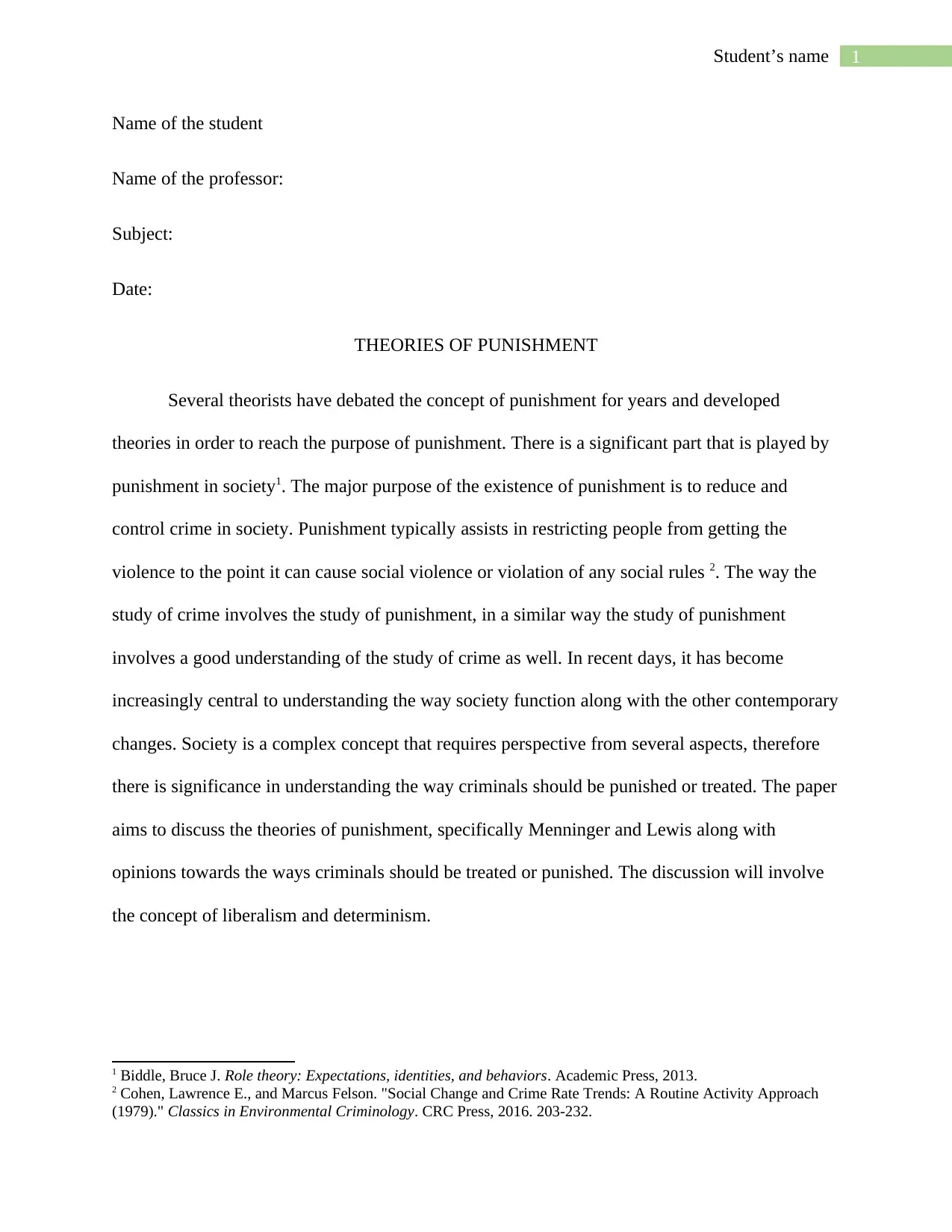
1Student’s name
Name of the student
Name of the professor:
Subject:
Date:
THEORIES OF PUNISHMENT
Several theorists have debated the concept of punishment for years and developed
theories in order to reach the purpose of punishment. There is a significant part that is played by
punishment in society1. The major purpose of the existence of punishment is to reduce and
control crime in society. Punishment typically assists in restricting people from getting the
violence to the point it can cause social violence or violation of any social rules 2. The way the
study of crime involves the study of punishment, in a similar way the study of punishment
involves a good understanding of the study of crime as well. In recent days, it has become
increasingly central to understanding the way society function along with the other contemporary
changes. Society is a complex concept that requires perspective from several aspects, therefore
there is significance in understanding the way criminals should be punished or treated. The paper
aims to discuss the theories of punishment, specifically Menninger and Lewis along with
opinions towards the ways criminals should be treated or punished. The discussion will involve
the concept of liberalism and determinism.
1 Biddle, Bruce J. Role theory: Expectations, identities, and behaviors. Academic Press, 2013.
2 Cohen, Lawrence E., and Marcus Felson. "Social Change and Crime Rate Trends: A Routine Activity Approach
(1979)." Classics in Environmental Criminology. CRC Press, 2016. 203-232.
Name of the student
Name of the professor:
Subject:
Date:
THEORIES OF PUNISHMENT
Several theorists have debated the concept of punishment for years and developed
theories in order to reach the purpose of punishment. There is a significant part that is played by
punishment in society1. The major purpose of the existence of punishment is to reduce and
control crime in society. Punishment typically assists in restricting people from getting the
violence to the point it can cause social violence or violation of any social rules 2. The way the
study of crime involves the study of punishment, in a similar way the study of punishment
involves a good understanding of the study of crime as well. In recent days, it has become
increasingly central to understanding the way society function along with the other contemporary
changes. Society is a complex concept that requires perspective from several aspects, therefore
there is significance in understanding the way criminals should be punished or treated. The paper
aims to discuss the theories of punishment, specifically Menninger and Lewis along with
opinions towards the ways criminals should be treated or punished. The discussion will involve
the concept of liberalism and determinism.
1 Biddle, Bruce J. Role theory: Expectations, identities, and behaviors. Academic Press, 2013.
2 Cohen, Lawrence E., and Marcus Felson. "Social Change and Crime Rate Trends: A Routine Activity Approach
(1979)." Classics in Environmental Criminology. CRC Press, 2016. 203-232.
Paraphrase This Document
Need a fresh take? Get an instant paraphrase of this document with our AI Paraphraser
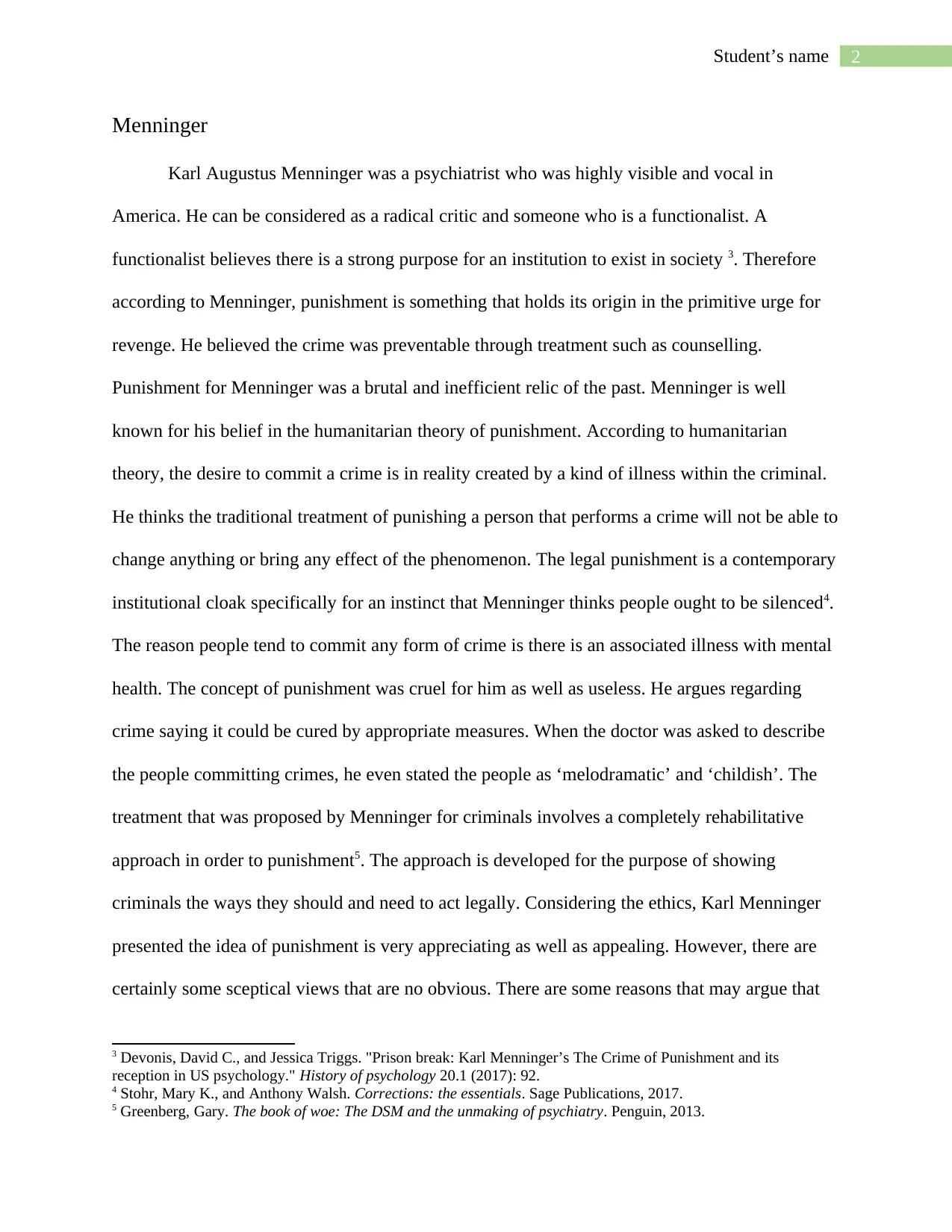
2Student’s name
Menninger
Karl Augustus Menninger was a psychiatrist who was highly visible and vocal in
America. He can be considered as a radical critic and someone who is a functionalist. A
functionalist believes there is a strong purpose for an institution to exist in society 3. Therefore
according to Menninger, punishment is something that holds its origin in the primitive urge for
revenge. He believed the crime was preventable through treatment such as counselling.
Punishment for Menninger was a brutal and inefficient relic of the past. Menninger is well
known for his belief in the humanitarian theory of punishment. According to humanitarian
theory, the desire to commit a crime is in reality created by a kind of illness within the criminal.
He thinks the traditional treatment of punishing a person that performs a crime will not be able to
change anything or bring any effect of the phenomenon. The legal punishment is a contemporary
institutional cloak specifically for an instinct that Menninger thinks people ought to be silenced4.
The reason people tend to commit any form of crime is there is an associated illness with mental
health. The concept of punishment was cruel for him as well as useless. He argues regarding
crime saying it could be cured by appropriate measures. When the doctor was asked to describe
the people committing crimes, he even stated the people as ‘melodramatic’ and ‘childish’. The
treatment that was proposed by Menninger for criminals involves a completely rehabilitative
approach in order to punishment5. The approach is developed for the purpose of showing
criminals the ways they should and need to act legally. Considering the ethics, Karl Menninger
presented the idea of punishment is very appreciating as well as appealing. However, there are
certainly some sceptical views that are no obvious. There are some reasons that may argue that
3 Devonis, David C., and Jessica Triggs. "Prison break: Karl Menninger’s The Crime of Punishment and its
reception in US psychology." History of psychology 20.1 (2017): 92.
4 Stohr, Mary K., and Anthony Walsh. Corrections: the essentials. Sage Publications, 2017.
5 Greenberg, Gary. The book of woe: The DSM and the unmaking of psychiatry. Penguin, 2013.
Menninger
Karl Augustus Menninger was a psychiatrist who was highly visible and vocal in
America. He can be considered as a radical critic and someone who is a functionalist. A
functionalist believes there is a strong purpose for an institution to exist in society 3. Therefore
according to Menninger, punishment is something that holds its origin in the primitive urge for
revenge. He believed the crime was preventable through treatment such as counselling.
Punishment for Menninger was a brutal and inefficient relic of the past. Menninger is well
known for his belief in the humanitarian theory of punishment. According to humanitarian
theory, the desire to commit a crime is in reality created by a kind of illness within the criminal.
He thinks the traditional treatment of punishing a person that performs a crime will not be able to
change anything or bring any effect of the phenomenon. The legal punishment is a contemporary
institutional cloak specifically for an instinct that Menninger thinks people ought to be silenced4.
The reason people tend to commit any form of crime is there is an associated illness with mental
health. The concept of punishment was cruel for him as well as useless. He argues regarding
crime saying it could be cured by appropriate measures. When the doctor was asked to describe
the people committing crimes, he even stated the people as ‘melodramatic’ and ‘childish’. The
treatment that was proposed by Menninger for criminals involves a completely rehabilitative
approach in order to punishment5. The approach is developed for the purpose of showing
criminals the ways they should and need to act legally. Considering the ethics, Karl Menninger
presented the idea of punishment is very appreciating as well as appealing. However, there are
certainly some sceptical views that are no obvious. There are some reasons that may argue that
3 Devonis, David C., and Jessica Triggs. "Prison break: Karl Menninger’s The Crime of Punishment and its
reception in US psychology." History of psychology 20.1 (2017): 92.
4 Stohr, Mary K., and Anthony Walsh. Corrections: the essentials. Sage Publications, 2017.
5 Greenberg, Gary. The book of woe: The DSM and the unmaking of psychiatry. Penguin, 2013.
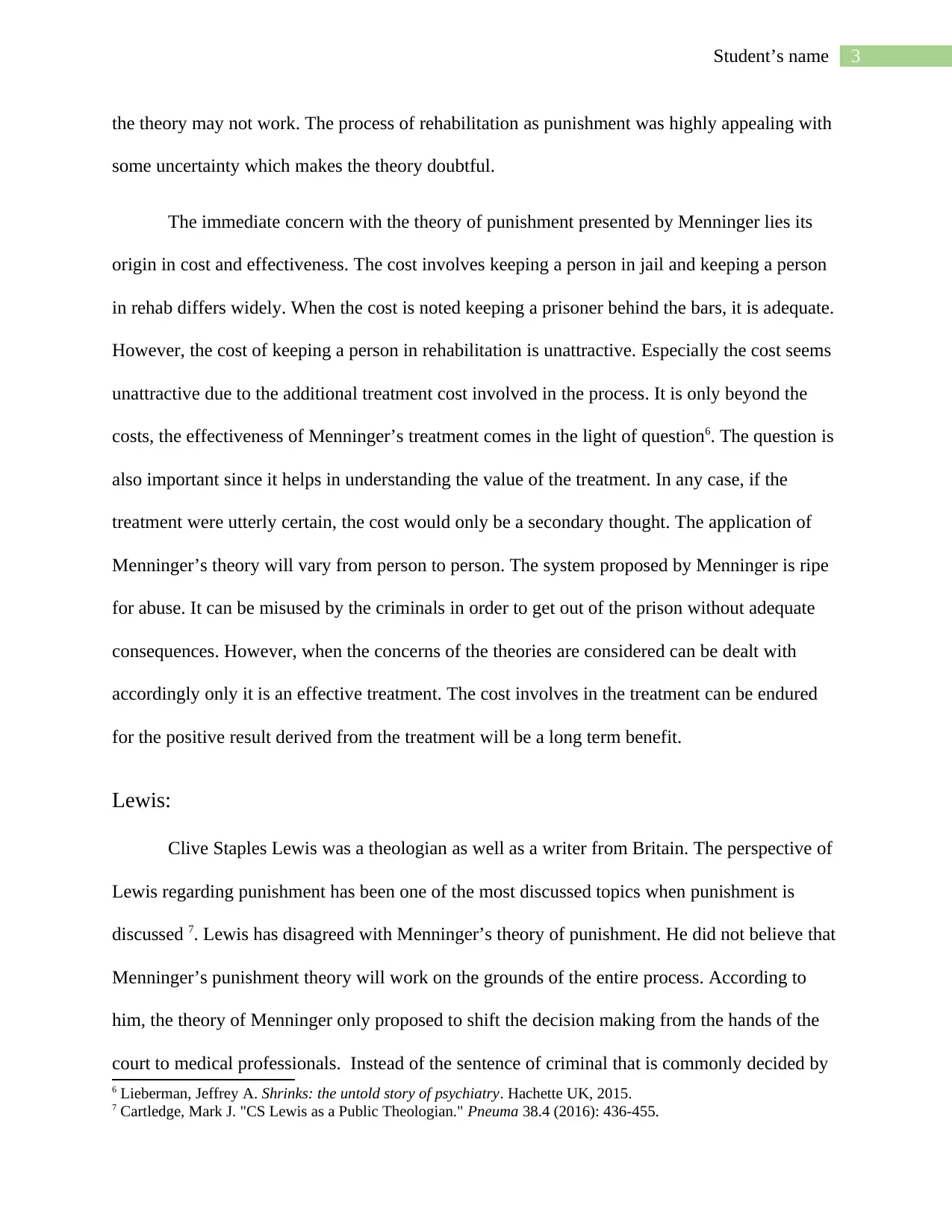
3Student’s name
the theory may not work. The process of rehabilitation as punishment was highly appealing with
some uncertainty which makes the theory doubtful.
The immediate concern with the theory of punishment presented by Menninger lies its
origin in cost and effectiveness. The cost involves keeping a person in jail and keeping a person
in rehab differs widely. When the cost is noted keeping a prisoner behind the bars, it is adequate.
However, the cost of keeping a person in rehabilitation is unattractive. Especially the cost seems
unattractive due to the additional treatment cost involved in the process. It is only beyond the
costs, the effectiveness of Menninger’s treatment comes in the light of question6. The question is
also important since it helps in understanding the value of the treatment. In any case, if the
treatment were utterly certain, the cost would only be a secondary thought. The application of
Menninger’s theory will vary from person to person. The system proposed by Menninger is ripe
for abuse. It can be misused by the criminals in order to get out of the prison without adequate
consequences. However, when the concerns of the theories are considered can be dealt with
accordingly only it is an effective treatment. The cost involves in the treatment can be endured
for the positive result derived from the treatment will be a long term benefit.
Lewis:
Clive Staples Lewis was a theologian as well as a writer from Britain. The perspective of
Lewis regarding punishment has been one of the most discussed topics when punishment is
discussed 7. Lewis has disagreed with Menninger’s theory of punishment. He did not believe that
Menninger’s punishment theory will work on the grounds of the entire process. According to
him, the theory of Menninger only proposed to shift the decision making from the hands of the
court to medical professionals. Instead of the sentence of criminal that is commonly decided by
6 Lieberman, Jeffrey A. Shrinks: the untold story of psychiatry. Hachette UK, 2015.
7 Cartledge, Mark J. "CS Lewis as a Public Theologian." Pneuma 38.4 (2016): 436-455.
the theory may not work. The process of rehabilitation as punishment was highly appealing with
some uncertainty which makes the theory doubtful.
The immediate concern with the theory of punishment presented by Menninger lies its
origin in cost and effectiveness. The cost involves keeping a person in jail and keeping a person
in rehab differs widely. When the cost is noted keeping a prisoner behind the bars, it is adequate.
However, the cost of keeping a person in rehabilitation is unattractive. Especially the cost seems
unattractive due to the additional treatment cost involved in the process. It is only beyond the
costs, the effectiveness of Menninger’s treatment comes in the light of question6. The question is
also important since it helps in understanding the value of the treatment. In any case, if the
treatment were utterly certain, the cost would only be a secondary thought. The application of
Menninger’s theory will vary from person to person. The system proposed by Menninger is ripe
for abuse. It can be misused by the criminals in order to get out of the prison without adequate
consequences. However, when the concerns of the theories are considered can be dealt with
accordingly only it is an effective treatment. The cost involves in the treatment can be endured
for the positive result derived from the treatment will be a long term benefit.
Lewis:
Clive Staples Lewis was a theologian as well as a writer from Britain. The perspective of
Lewis regarding punishment has been one of the most discussed topics when punishment is
discussed 7. Lewis has disagreed with Menninger’s theory of punishment. He did not believe that
Menninger’s punishment theory will work on the grounds of the entire process. According to
him, the theory of Menninger only proposed to shift the decision making from the hands of the
court to medical professionals. Instead of the sentence of criminal that is commonly decided by
6 Lieberman, Jeffrey A. Shrinks: the untold story of psychiatry. Hachette UK, 2015.
7 Cartledge, Mark J. "CS Lewis as a Public Theologian." Pneuma 38.4 (2016): 436-455.
⊘ This is a preview!⊘
Do you want full access?
Subscribe today to unlock all pages.

Trusted by 1+ million students worldwide
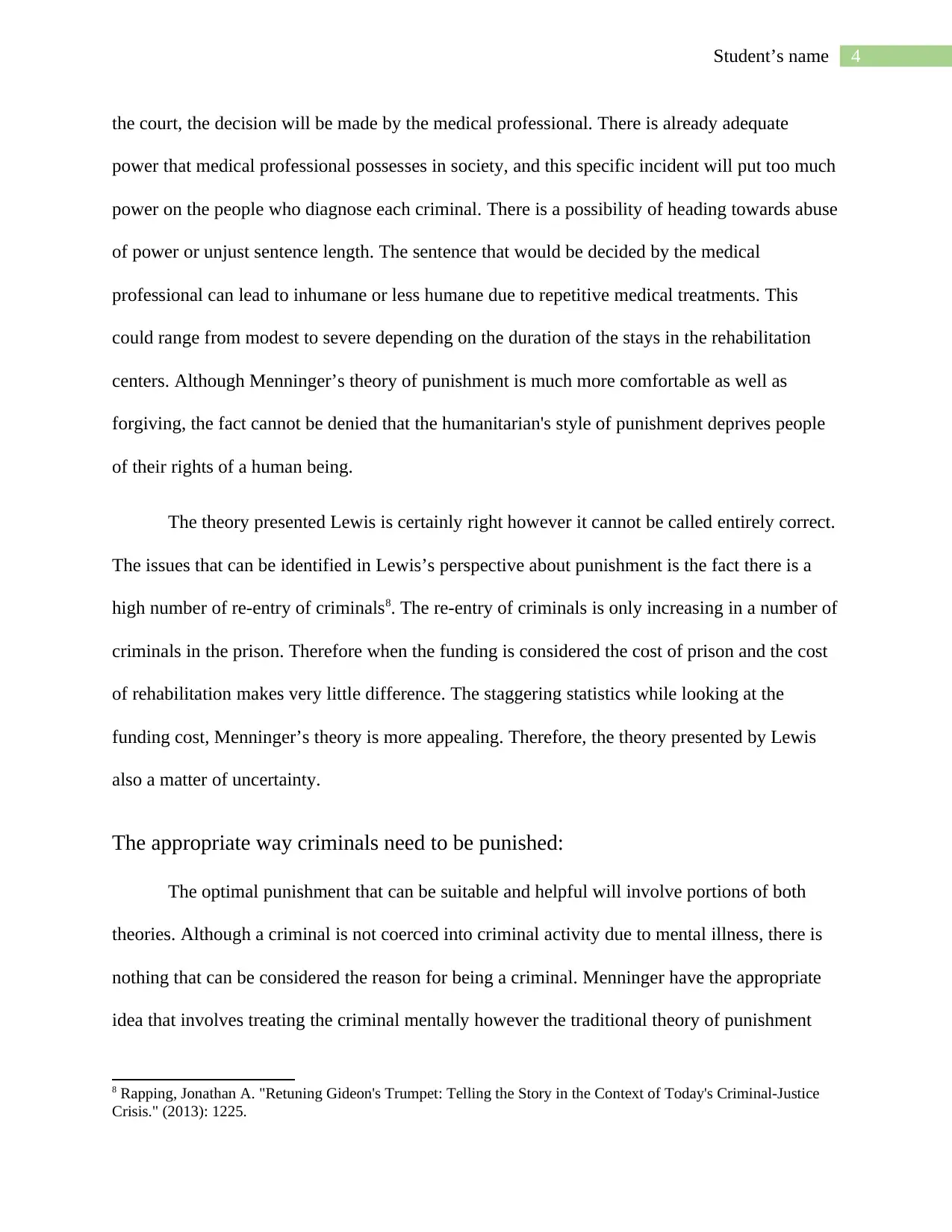
4Student’s name
the court, the decision will be made by the medical professional. There is already adequate
power that medical professional possesses in society, and this specific incident will put too much
power on the people who diagnose each criminal. There is a possibility of heading towards abuse
of power or unjust sentence length. The sentence that would be decided by the medical
professional can lead to inhumane or less humane due to repetitive medical treatments. This
could range from modest to severe depending on the duration of the stays in the rehabilitation
centers. Although Menninger’s theory of punishment is much more comfortable as well as
forgiving, the fact cannot be denied that the humanitarian's style of punishment deprives people
of their rights of a human being.
The theory presented Lewis is certainly right however it cannot be called entirely correct.
The issues that can be identified in Lewis’s perspective about punishment is the fact there is a
high number of re-entry of criminals8. The re-entry of criminals is only increasing in a number of
criminals in the prison. Therefore when the funding is considered the cost of prison and the cost
of rehabilitation makes very little difference. The staggering statistics while looking at the
funding cost, Menninger’s theory is more appealing. Therefore, the theory presented by Lewis
also a matter of uncertainty.
The appropriate way criminals need to be punished:
The optimal punishment that can be suitable and helpful will involve portions of both
theories. Although a criminal is not coerced into criminal activity due to mental illness, there is
nothing that can be considered the reason for being a criminal. Menninger have the appropriate
idea that involves treating the criminal mentally however the traditional theory of punishment
8 Rapping, Jonathan A. "Retuning Gideon's Trumpet: Telling the Story in the Context of Today's Criminal-Justice
Crisis." (2013): 1225.
the court, the decision will be made by the medical professional. There is already adequate
power that medical professional possesses in society, and this specific incident will put too much
power on the people who diagnose each criminal. There is a possibility of heading towards abuse
of power or unjust sentence length. The sentence that would be decided by the medical
professional can lead to inhumane or less humane due to repetitive medical treatments. This
could range from modest to severe depending on the duration of the stays in the rehabilitation
centers. Although Menninger’s theory of punishment is much more comfortable as well as
forgiving, the fact cannot be denied that the humanitarian's style of punishment deprives people
of their rights of a human being.
The theory presented Lewis is certainly right however it cannot be called entirely correct.
The issues that can be identified in Lewis’s perspective about punishment is the fact there is a
high number of re-entry of criminals8. The re-entry of criminals is only increasing in a number of
criminals in the prison. Therefore when the funding is considered the cost of prison and the cost
of rehabilitation makes very little difference. The staggering statistics while looking at the
funding cost, Menninger’s theory is more appealing. Therefore, the theory presented by Lewis
also a matter of uncertainty.
The appropriate way criminals need to be punished:
The optimal punishment that can be suitable and helpful will involve portions of both
theories. Although a criminal is not coerced into criminal activity due to mental illness, there is
nothing that can be considered the reason for being a criminal. Menninger have the appropriate
idea that involves treating the criminal mentally however the traditional theory of punishment
8 Rapping, Jonathan A. "Retuning Gideon's Trumpet: Telling the Story in the Context of Today's Criminal-Justice
Crisis." (2013): 1225.
Paraphrase This Document
Need a fresh take? Get an instant paraphrase of this document with our AI Paraphraser
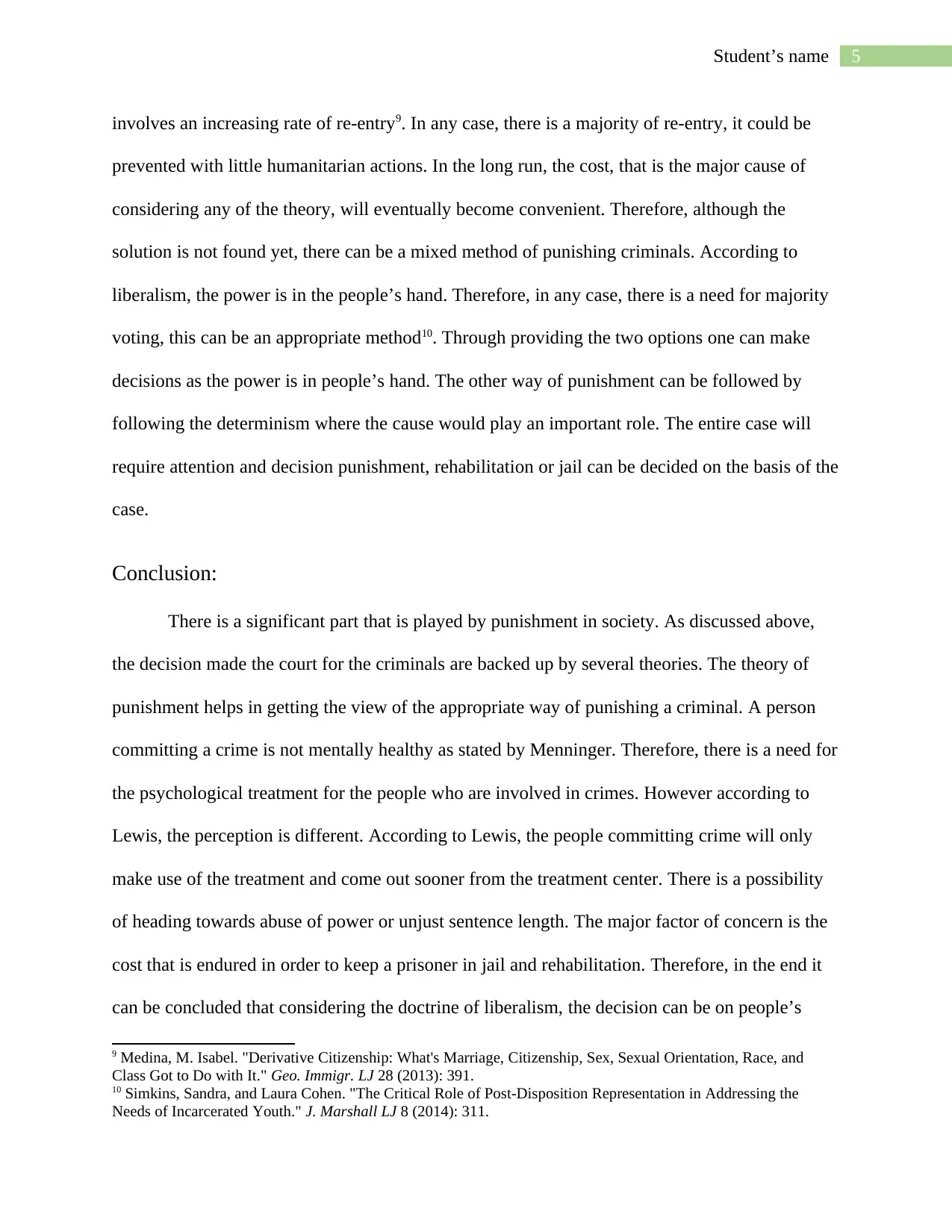
5Student’s name
involves an increasing rate of re-entry9. In any case, there is a majority of re-entry, it could be
prevented with little humanitarian actions. In the long run, the cost, that is the major cause of
considering any of the theory, will eventually become convenient. Therefore, although the
solution is not found yet, there can be a mixed method of punishing criminals. According to
liberalism, the power is in the people’s hand. Therefore, in any case, there is a need for majority
voting, this can be an appropriate method10. Through providing the two options one can make
decisions as the power is in people’s hand. The other way of punishment can be followed by
following the determinism where the cause would play an important role. The entire case will
require attention and decision punishment, rehabilitation or jail can be decided on the basis of the
case.
Conclusion:
There is a significant part that is played by punishment in society. As discussed above,
the decision made the court for the criminals are backed up by several theories. The theory of
punishment helps in getting the view of the appropriate way of punishing a criminal. A person
committing a crime is not mentally healthy as stated by Menninger. Therefore, there is a need for
the psychological treatment for the people who are involved in crimes. However according to
Lewis, the perception is different. According to Lewis, the people committing crime will only
make use of the treatment and come out sooner from the treatment center. There is a possibility
of heading towards abuse of power or unjust sentence length. The major factor of concern is the
cost that is endured in order to keep a prisoner in jail and rehabilitation. Therefore, in the end it
can be concluded that considering the doctrine of liberalism, the decision can be on people’s
9 Medina, M. Isabel. "Derivative Citizenship: What's Marriage, Citizenship, Sex, Sexual Orientation, Race, and
Class Got to Do with It." Geo. Immigr. LJ 28 (2013): 391.
10 Simkins, Sandra, and Laura Cohen. "The Critical Role of Post-Disposition Representation in Addressing the
Needs of Incarcerated Youth." J. Marshall LJ 8 (2014): 311.
involves an increasing rate of re-entry9. In any case, there is a majority of re-entry, it could be
prevented with little humanitarian actions. In the long run, the cost, that is the major cause of
considering any of the theory, will eventually become convenient. Therefore, although the
solution is not found yet, there can be a mixed method of punishing criminals. According to
liberalism, the power is in the people’s hand. Therefore, in any case, there is a need for majority
voting, this can be an appropriate method10. Through providing the two options one can make
decisions as the power is in people’s hand. The other way of punishment can be followed by
following the determinism where the cause would play an important role. The entire case will
require attention and decision punishment, rehabilitation or jail can be decided on the basis of the
case.
Conclusion:
There is a significant part that is played by punishment in society. As discussed above,
the decision made the court for the criminals are backed up by several theories. The theory of
punishment helps in getting the view of the appropriate way of punishing a criminal. A person
committing a crime is not mentally healthy as stated by Menninger. Therefore, there is a need for
the psychological treatment for the people who are involved in crimes. However according to
Lewis, the perception is different. According to Lewis, the people committing crime will only
make use of the treatment and come out sooner from the treatment center. There is a possibility
of heading towards abuse of power or unjust sentence length. The major factor of concern is the
cost that is endured in order to keep a prisoner in jail and rehabilitation. Therefore, in the end it
can be concluded that considering the doctrine of liberalism, the decision can be on people’s
9 Medina, M. Isabel. "Derivative Citizenship: What's Marriage, Citizenship, Sex, Sexual Orientation, Race, and
Class Got to Do with It." Geo. Immigr. LJ 28 (2013): 391.
10 Simkins, Sandra, and Laura Cohen. "The Critical Role of Post-Disposition Representation in Addressing the
Needs of Incarcerated Youth." J. Marshall LJ 8 (2014): 311.

6Student’s name
hand. According to the doctrine of determinism, the accurate punishment can also be on the basis
of the cause. The reason for being the criminal.
hand. According to the doctrine of determinism, the accurate punishment can also be on the basis
of the cause. The reason for being the criminal.
⊘ This is a preview!⊘
Do you want full access?
Subscribe today to unlock all pages.

Trusted by 1+ million students worldwide
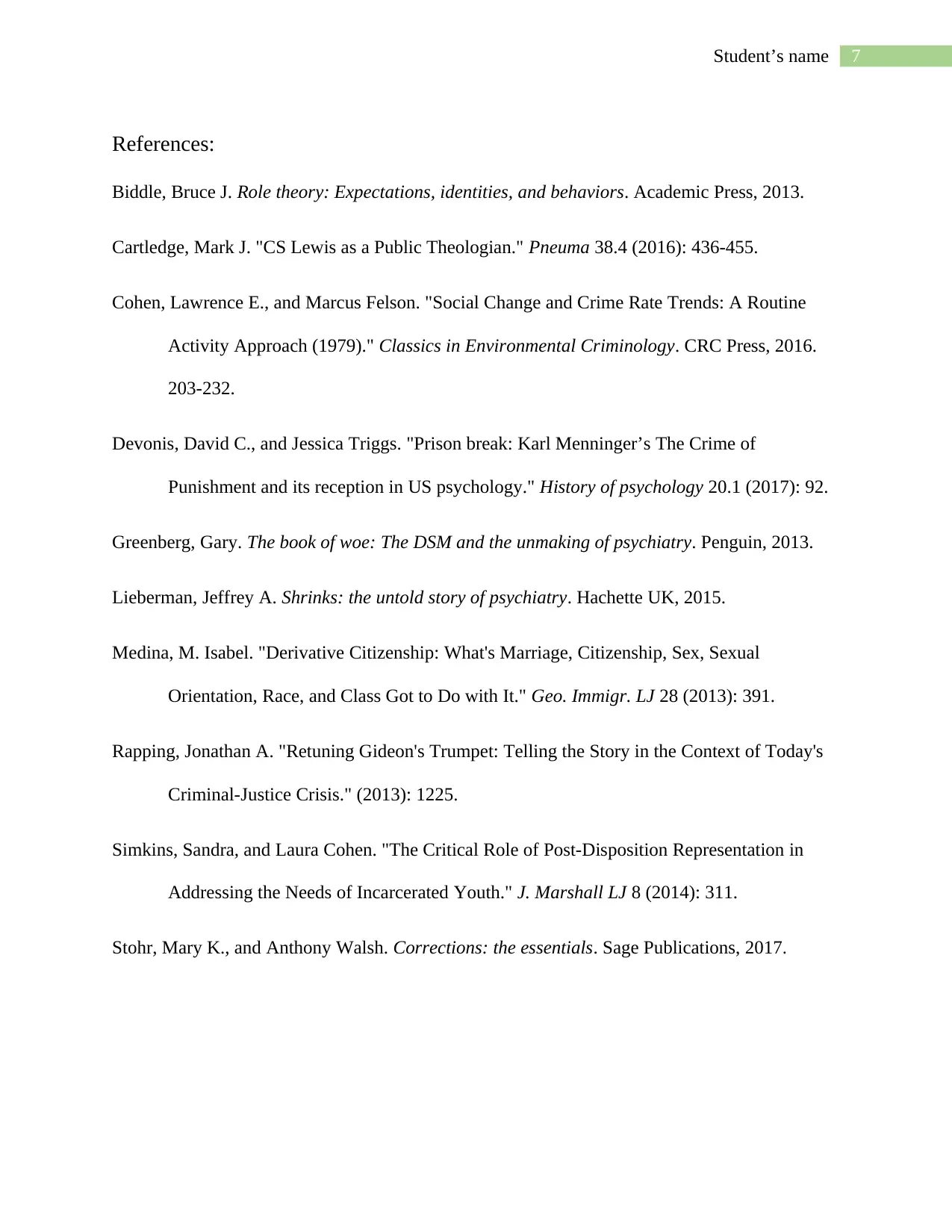
7Student’s name
References:
Biddle, Bruce J. Role theory: Expectations, identities, and behaviors. Academic Press, 2013.
Cartledge, Mark J. "CS Lewis as a Public Theologian." Pneuma 38.4 (2016): 436-455.
Cohen, Lawrence E., and Marcus Felson. "Social Change and Crime Rate Trends: A Routine
Activity Approach (1979)." Classics in Environmental Criminology. CRC Press, 2016.
203-232.
Devonis, David C., and Jessica Triggs. "Prison break: Karl Menninger’s The Crime of
Punishment and its reception in US psychology." History of psychology 20.1 (2017): 92.
Greenberg, Gary. The book of woe: The DSM and the unmaking of psychiatry. Penguin, 2013.
Lieberman, Jeffrey A. Shrinks: the untold story of psychiatry. Hachette UK, 2015.
Medina, M. Isabel. "Derivative Citizenship: What's Marriage, Citizenship, Sex, Sexual
Orientation, Race, and Class Got to Do with It." Geo. Immigr. LJ 28 (2013): 391.
Rapping, Jonathan A. "Retuning Gideon's Trumpet: Telling the Story in the Context of Today's
Criminal-Justice Crisis." (2013): 1225.
Simkins, Sandra, and Laura Cohen. "The Critical Role of Post-Disposition Representation in
Addressing the Needs of Incarcerated Youth." J. Marshall LJ 8 (2014): 311.
Stohr, Mary K., and Anthony Walsh. Corrections: the essentials. Sage Publications, 2017.
References:
Biddle, Bruce J. Role theory: Expectations, identities, and behaviors. Academic Press, 2013.
Cartledge, Mark J. "CS Lewis as a Public Theologian." Pneuma 38.4 (2016): 436-455.
Cohen, Lawrence E., and Marcus Felson. "Social Change and Crime Rate Trends: A Routine
Activity Approach (1979)." Classics in Environmental Criminology. CRC Press, 2016.
203-232.
Devonis, David C., and Jessica Triggs. "Prison break: Karl Menninger’s The Crime of
Punishment and its reception in US psychology." History of psychology 20.1 (2017): 92.
Greenberg, Gary. The book of woe: The DSM and the unmaking of psychiatry. Penguin, 2013.
Lieberman, Jeffrey A. Shrinks: the untold story of psychiatry. Hachette UK, 2015.
Medina, M. Isabel. "Derivative Citizenship: What's Marriage, Citizenship, Sex, Sexual
Orientation, Race, and Class Got to Do with It." Geo. Immigr. LJ 28 (2013): 391.
Rapping, Jonathan A. "Retuning Gideon's Trumpet: Telling the Story in the Context of Today's
Criminal-Justice Crisis." (2013): 1225.
Simkins, Sandra, and Laura Cohen. "The Critical Role of Post-Disposition Representation in
Addressing the Needs of Incarcerated Youth." J. Marshall LJ 8 (2014): 311.
Stohr, Mary K., and Anthony Walsh. Corrections: the essentials. Sage Publications, 2017.
1 out of 7
Related Documents
Your All-in-One AI-Powered Toolkit for Academic Success.
+13062052269
info@desklib.com
Available 24*7 on WhatsApp / Email
![[object Object]](/_next/static/media/star-bottom.7253800d.svg)
Unlock your academic potential
Copyright © 2020–2026 A2Z Services. All Rights Reserved. Developed and managed by ZUCOL.




